Key takeaways:
- Digital archives offer unprecedented accessibility to historical information, enriching research by connecting diverse sources and perspectives.
- Various types of digital archives, including institutional, thematic, and personal archives, serve distinct purposes and provide a deeper understanding of specific subjects or events.
- Utilizing tools such as specialized search engines, citation managers, and browser extensions can significantly enhance the research experience and streamline access to academic resources.
- A clear research question guides the exploration of digital archives, transforming a potentially aimless search into a focused and rewarding discovery journey.
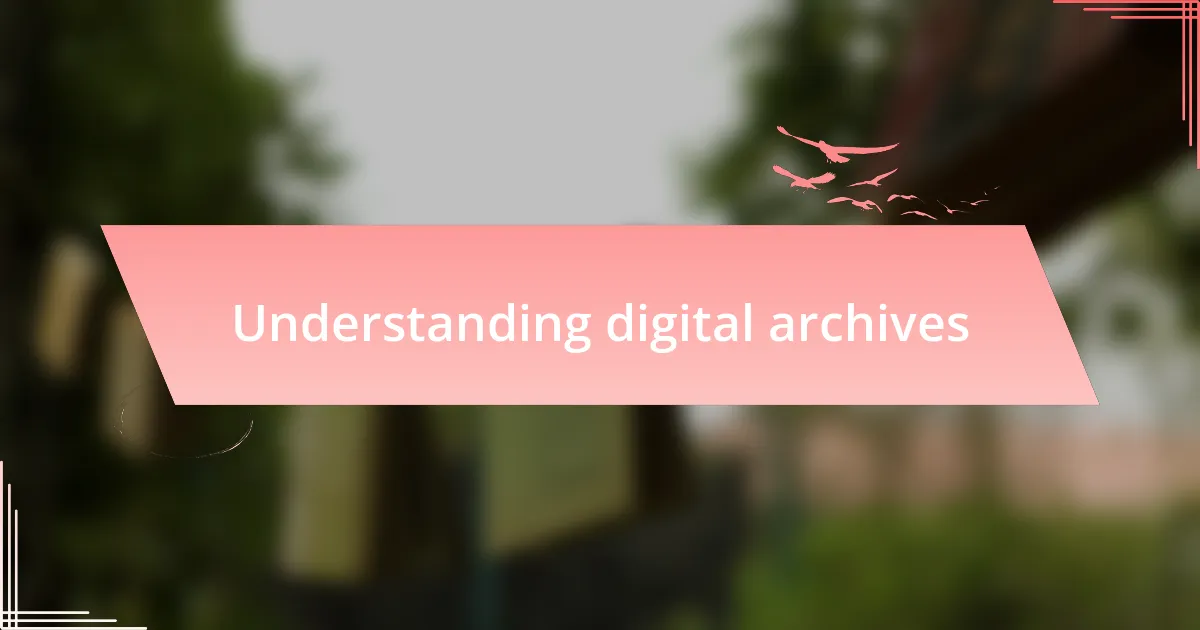
Understanding digital archives
Digital archives serve as a treasure trove of historical information, housing a vast array of documents, photographs, and multimedia resources. I remember sifting through an online archive filled with letters from the past, which offered me a palpable connection to the experiences of those who lived long before my time. Have you ever felt that thrill of discovering a piece of history that resonates with your own experiences?
Understanding digital archives means recognizing their potential to reshape the way we view research. They provide not only access to rare materials but also new contexts for understanding our current world. For instance, while exploring a digital archive of 20th-century journalism, I found articles that mirrored today’s social issues, reminding me that history often repeats itself. It’s a beautiful reminder of the cyclical nature of human experience.
Moreover, these archives can evoke a deep emotional response, allowing us to engage with the material on a personal level. The stories behind the documents often echo our own narratives, creating a bridge between the past and present. What have you discovered in a digital archive that felt like it was speaking directly to you? I once stumbled upon a collection of diary entries that echoed my own thoughts during a challenging time, illustrating how interconnected our stories truly are.
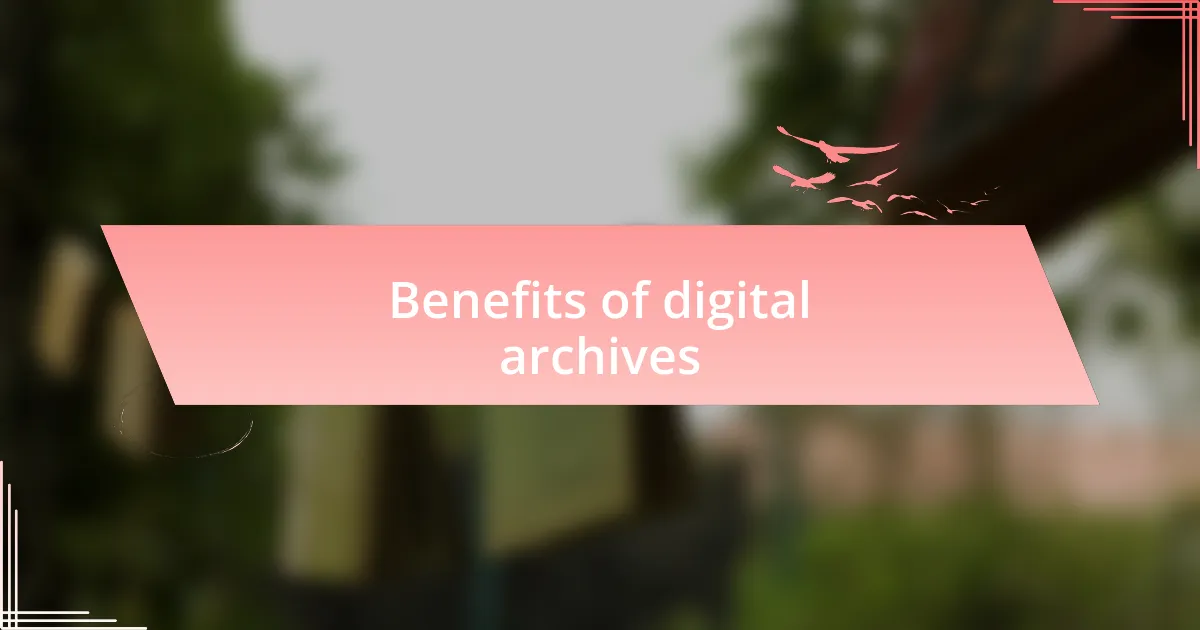
Benefits of digital archives
Digital archives provide unparalleled accessibility, enabling anyone with an internet connection to explore a multitude of resources from anywhere in the world. I often think back to a late-night research session where I uncovered a rare documentary from the 1960s, sparking a passionate discussion with friends about that era’s cultural shifts. Isn’t it amazing how a single film can bridge generations and provide a deeper understanding of the past?
Another significant advantage of digital archives is the ability to connect disparate sources, unveiling relationships that might have otherwise gone unnoticed. While researching a historical figure, I found articles, photographs, and personal letters that painted a richer picture of their life than any single book could. Have you ever pieced together a narrative from multiple sources? It’s a rewarding puzzle that enhances our comprehension of history’s intricate tapestry.
Furthermore, digital archives often come equipped with powerful search functions that save time and streamline the research process. I remember the frustration of wading through stacks of dusty books to find a single fact, but now I can search key terms with a few clicks. How much easier would your research have been if you could instantly find what you were looking for? For me, this feature has transformed tedious research into an engaging journey of discovery.
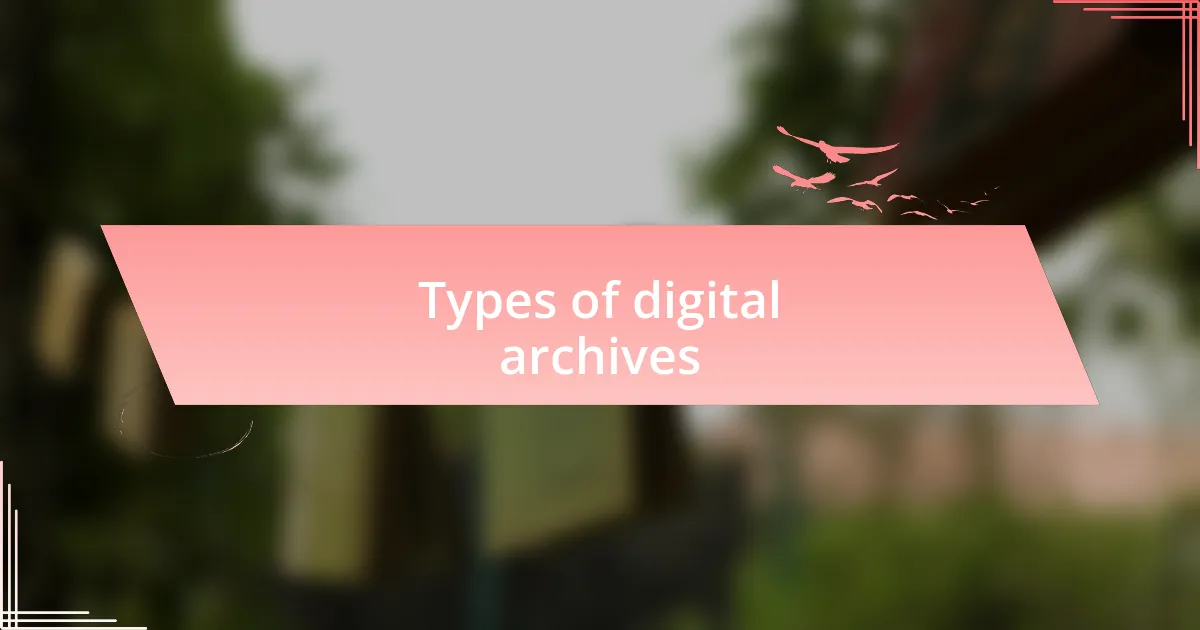
Types of digital archives
Digital archives come in various forms, each serving a distinct purpose. I often rely on institutional archives, like university special collections, which house vast troves of manuscripts and rare books. Have you ever wandered into an archive and felt the weight of history around you? It’s an exhilarating experience that makes me feel connected to the scholars and thinkers who came before me.
Then there are thematic archives, which focus on specific subjects or events. For example, while researching the Cold War, I found a digital archive dedicated entirely to that era, filled with documents, audio clips, and interviews. It struck me how a specific theme can unify diverse materials, allowing researchers to delve deeply into a topic without sifting through unrelated content. How often do we overlook the depth that a subject-focused archive can offer?
Lastly, personal or community archives capture the stories and experiences of everyday people. I remember exploring an online collection of oral histories from locals in my hometown, where I discovered firsthand accounts of events that shaped our community. Isn’t it fascinating how a simple anecdote can highlight larger social issues? These personal slices of life can truly enrich our understanding of broader historical narratives.
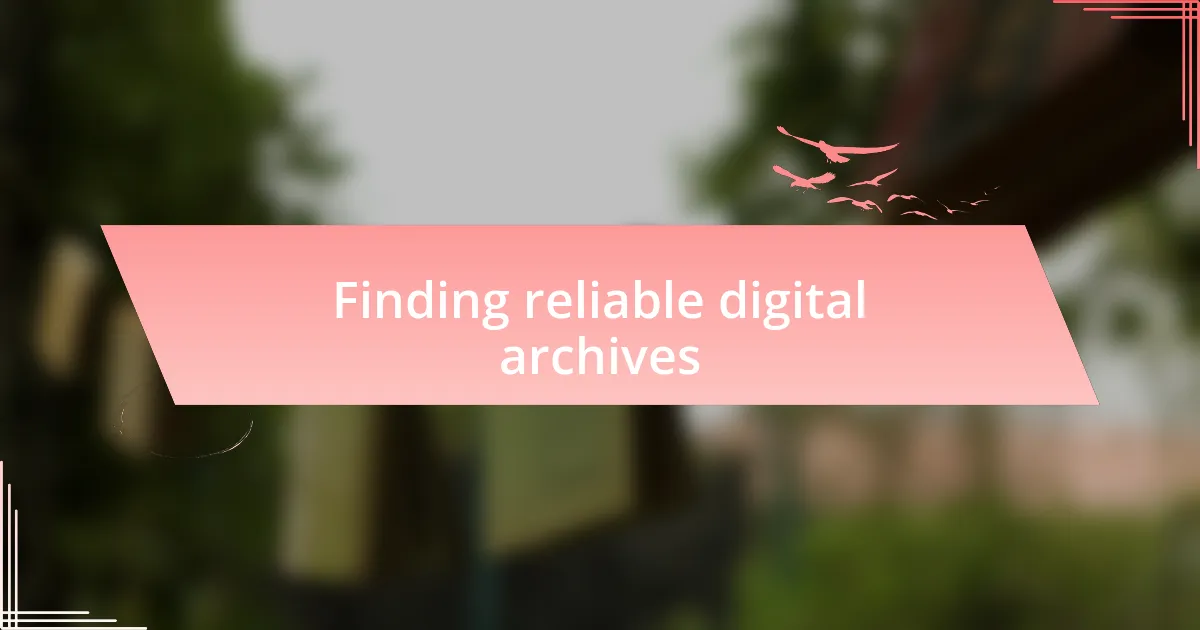
Finding reliable digital archives
Finding reliable digital archives starts with identifying reputable institutions. I’ve often turned to well-established university libraries or government repositories, which usually ensure a high standard of curation. Isn’t it reassuring to know that the documents you’re accessing have been vetted by experts?
Another effective strategy is to look for archives that are part of collaborative networks. For instance, I discovered an amazing digital archive when I stumbled upon a consortium of museums sharing their collections online. This not only broadened my access but also allowed for a richer intertextual experience, as multiple perspectives can illuminate a single topic in unexpected ways. How often do we realize that collaboration can lead to greater depth in research?
Lastly, checking user reviews or recommendations can be invaluable. When I was searching for a new archive to explore, I turned to academic forums and social media groups where researchers shared their experiences. I still remember how one recommendation led me to a hidden gem of a digital archive on environmental history, which turned out to be a pivotal resource for my project. Isn’t it incredible how connections within the research community can guide you to the best resources?
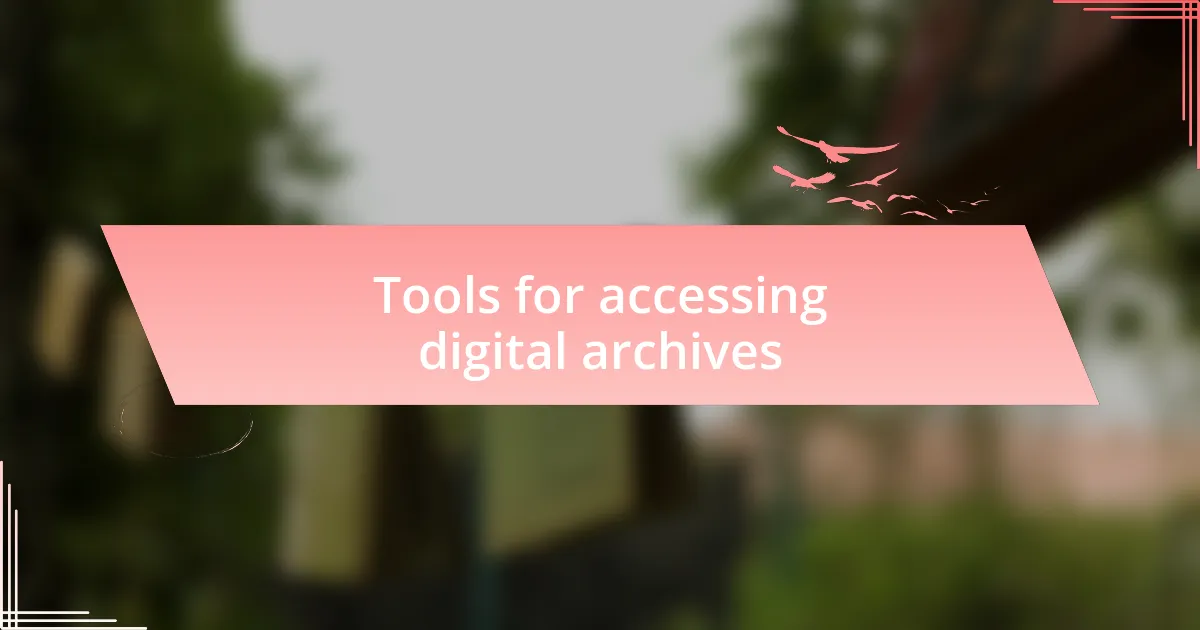
Tools for accessing digital archives
Tools for accessing digital archives can be as diverse as the collections they house. One of my go-to instruments is specialized search engines that focus solely on academic resources. When I first used one, the joy of finding rare documents with just a few keywords was exhilarating. Doesn’t it feel satisfying to uncover relevant materials so effortlessly?
Another valuable tool I’ve relied on is citation managers like Zotero or Mendeley. These tools not only help organize my findings but also make it easier to manage references. I remember feeling overwhelmed with the sheer volume of articles I had gathered for a project on digital literacy, but once I started categorizing them, everything clicked into place. Have you ever experienced that moment when chaos transforms into clarity?
Lastly, integrating browser extensions that provide direct links to full texts can be a game-changer. I often find myself reading scholarly articles, only to hit a paywall. The first time I installed an extension that bypassed those barriers, it felt like gaining access to an exclusive club. It’s amazing how such tools can level the playing field for researchers and make academic work more inclusive.
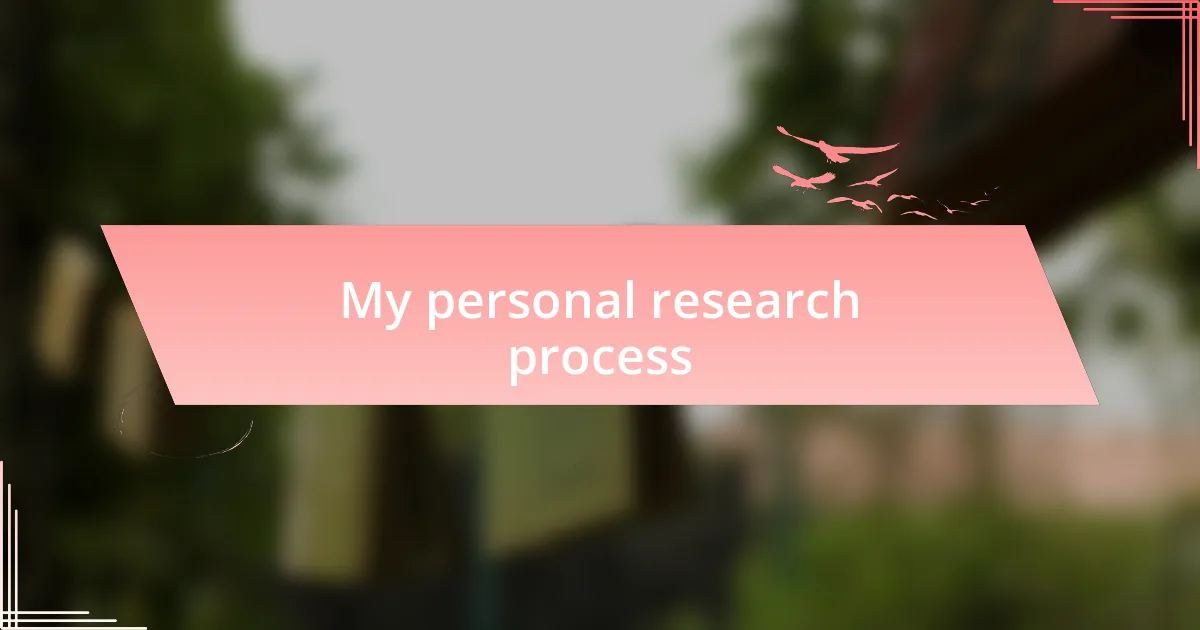
My personal research process
When I embark on a research project, I start by defining a clear question or topic. It’s a bit like setting sail with a compass; without it, I might drift aimlessly. I recall a time when I spent hours just roaming through digital archives, and it wasn’t until I framed my focus that I truly began to uncover valuable insights. Have you ever felt directionless in your research until a single question suddenly made everything fall into place?
Once I have my topic, I dive deep into the archives, allowing myself to wander through the vast collections. It’s an experience I cherish—the thrill of discovery can be addictive. I vividly remember stumbling upon an old manuscript that sparked a whole new line of inquiry for me. Isn’t it exhilarating when a single piece of information ignites your curiosity?
As I gather data, I make it a point to take notes not just on content, but on my reactions and thoughts as well. These reflections often serve as breadcrumbs for my later writing. I find that capturing those moments of insight keeps my research grounded in personal experience, allowing me to connect more deeply with my audience. Have you tried incorporating your own thoughts into your research notes? It can really transform how you engage with the material.